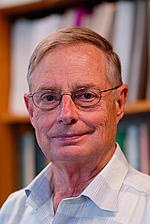Phillip Griffiths Awarded Chern Medal

PRESS CONTACT: Christine Ferrara, (609) 734-8239
Phillip Griffiths, Professor Emeritus in the School of Mathematics at the Institute for Advanced Study, has been awarded the Chern Medal by the International Mathematical Union (IMU) at the International Congress of Mathematicians, in Seoul, South Korea. The Chern Medal, established in 2010 in honor of mathematician Shiing-Shen Chern (1911–2004), is awarded every four years in recognition of outstanding and sustained achievements in the field. Griffiths, whose work has stimulated a wide range of advances in mathematics over the past 50 years, was cited by the IMU, the global mathematics professional organization, for his “groundbreaking and transformative development of transcendental methods in complex geometry, particularly his seminal work in Hodge theory and periods of algebraic varieties.” Of the $500,000 monetary award, half will be donated to support the African Mathematics Millennium Science Initiative (AMMSI), which is a distributed network of mathematics research, training and promotion throughout Africa.
Regarding the Chern Medal, which was presented to Griffiths by the President of Korea, Park Geun-hye, Griffiths commented, “This recognition is especially meaningful to me because of my personal association with Chern, who was my mentor, collaborator and friend for more than 40 years. He was a gifted teacher, and was generous with his time and knowledge. It is enormously gratifying to be able to honor his legacy by supporting a new generation of mathematicians in an environment where opportunities for research and training have been scarce.”
Griffiths is recognized as a singular figure in mathematics who has made significant contributions to the field, most notably in algebraic geometry and differential geometry. Griffiths initiated with his collaborators the theory of variation of Hodge structure, which has come to play a central role in many aspects of algebraic geometry, and its uses in modern theoretical physics. In addition to algebraic geometry, he has made contributions to geometric function theory and the geometry of partial differential equations. His insights on a variety of problems in real and complex geometry, as well as his leadership and mentoring of many of the world’s leading mathematicians, have created new areas of research and have helped to form deep and lasting connections across the field.
A former Director of the Institute (1991–2003), Griffiths chairs the Science Initiative Group (SIG) at the Institute, which fosters science in the developing world through programs such as the Regional Initiative in Science and Education (RISE), of which AMMSI is an affiliate network. RISE prepares PhD- and MSc-level scientists and engineers in sub-Saharan Africa through university-based research and training networks in selected disciplines. Its primary emphases are on training new faculty to teach in African universities and on upgrading the qualifications of current faculty.
The Chern Medal acknowledges the depth and impact of Griffiths’s achievements, many of which were inspired and influenced by Chern. Griffiths’ interest in science in developing countries was initiated by an extensive visit to China in 1980, arranged by Chern. A former Member (1943–45, 1949, 1954–55, 1964) in the Institute’s School of Mathematics, Chern described his time at the Institute as “decisive” in his career. While at the Institute, he discovered an intrinsic proof of the n-dimensional Gauss-Bonnet formula, which was the forerunner of other invariants that bear his name. One of these, the Chern-Simons invariants, was first described in a paper in 1974, coauthored by Chern and James Simons, former Member (1972) in the School and current Vice Chairman of the Institute’s Board of Trustees. Since 2004, the S.S. Chern Foundation for Mathematical Research has supported Memberships in the Institute’s School of Mathematics for scholars who are Chinese or of Chinese descent.
About the International Mathematical Union (IMU)
The IMU is the consortium of the national mathematics societies of 81 countries and is the organization that represents the international mathematics community. Every four years it sponsors an international congress, which is occurring this year in Seoul, South Korea. The Chern Medal for lifetime achievement is one of five prizes for outstanding accomplishments in mathematics awarded by the IMU at the Congress—the others are the Fields Medal, for mathematicians under the age of 40; the Rolf Nevanlinna Prize for computer science, also for mathematicians under the age of 40; the Carl Friedrich Gauss Prize for applied mathematics; and the Leelavati Prize for public outreach—and they are considered among the highest distinctions in the mathematical world.
About the Institute for Advanced Study
The Institute for Advanced Study is one of the world’s leading centers for theoretical research and intellectual inquiry. The Institute exists to encourage and support curiosity-driven research in the sciences and humanities—the original, often speculative thinking that produces advances in knowledge that change the way we understand the world. Work at the Institute takes place in four Schools: Historical Studies, Mathematics, Natural Sciences and Social Science. It provides for the mentoring of scholars by a permanent Faculty of approximately 30, and it ensures the freedom to undertake research that will make significant contributions in any of the broad range of fields in the sciences and humanities studied at the Institute.
The Institute, founded in 1930, is a private, independent academic institution located in Princeton, New Jersey. Its more than 6,000 former Members hold positions of intellectual and scientific leadership throughout the academic world. Thirty-three Nobel Laureates and 40 out of 56 Fields Medalists, as well as many winners of the Wolf and MacArthur prizes, have been affiliated with the Institute.